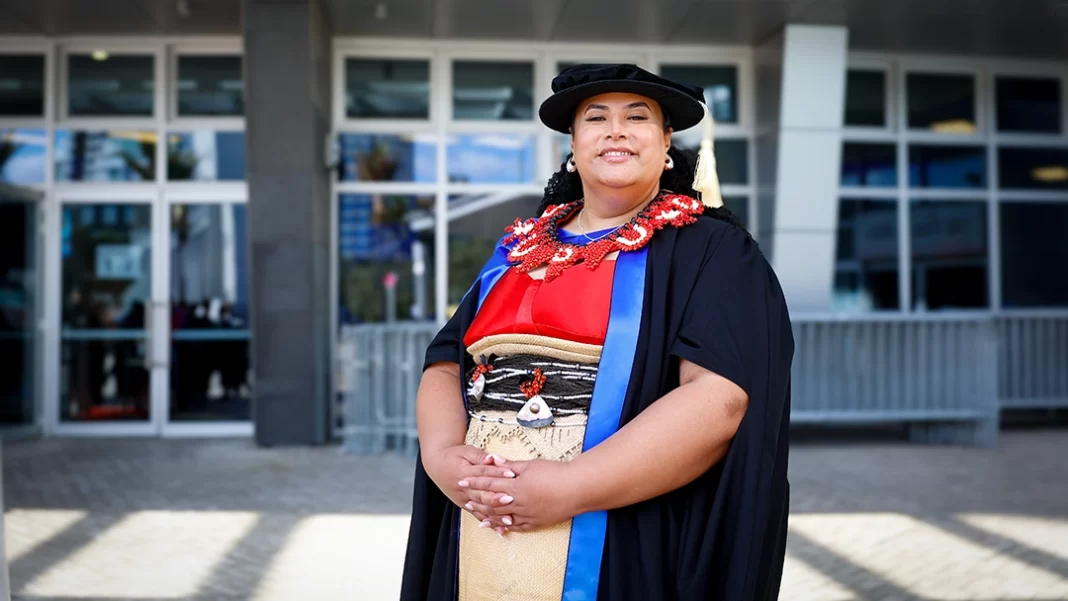Proudly identifying as leitī (a Tongan whose gender identity and/or expression differs from their assigned sex at birth), Dr Penni Wolfgramm crossed the stage in red at Spark Arena on 15 May, receiving her Doctor of Clinical Psychology degree from the University of Auckland. She was dressed by Cokana Fashion and makeupwithapi.
Her research focused on the experiences of Tongan leitī in Aotearoa, examining their development of identity and moʻui lelei (wellbeing) from childhood to adulthood. Grounded in Tongan methods, she used the Kakala (garland) research framework, talanoa (storytelling), and koloa (valued cultural treasures).
“My doctoral research was so close to home, being leitī myself. Hearing and sharing our life experiences has been the most rewarding part of this academic journey.”
With deep ties to the Pacific rainbow+ community, Dr Wolfgramm aims to fill the gap in Pacific rainbow+ data and advocates for change through her work.
“It has been an incredible journey. I came into this at the spritely age of 33, truly committed to where I wanted to engage my head, heart and hands — that is with people of colour and particularly, Māori and Pacific communities.
“The highlights of my doctoral research have included taking both the theoretical and practical learning, and considering it through indigenous Pacific ways of knowing, doing and being.”
Dr Wolfgramm was born in Aotearoa New Zealand. Her father, Albert Wolfgramm, is from ‘Utungake, Vava’u and Fasi mo e Afi in Tongatapu. Her mother, Monika Wolfgramm, was raised in Niutoua and has ties to Kolonga, Fungamisi, and Niuatoputapu. Her heritage also includes Prussian, German, and Irish ancestry.
“I was raised in the south of Auckland – Māngere East to be exact — and I still reside here,” she says.
Family and faith were the foundations of her academic journey.
“God has made all things possible for me and without my covenant with Him, I would not have been able to walk any journey, let alone this academic one.”
Beginning her doctoral work during the COVID-19 pandemic added unexpected hurdles.
“Though I appreciated the solitude at times — it was lonely. Also I was working three jobs at one stage. I burnt out at one point. That was a really challenging time. But when I look back, I think about what I actually had: faith, family, and friends. God never left me — I just felt I left Him.”
Support from her academic supervisors was vital. She credits Associate Professor Claire Cartwright, Seuta’afili Dr Patrick Thomsen, and Dr Fuafiva Fa’alau for trusting her and guiding her through the research.
She also prioritised physical and mental wellbeing, including personal therapy.
“I think it’s a must if you are going to study a Doctoral in Clinical Psychology, or at the very least, to have really good mentoring and professional supervision.”
Financial support from the University and the Ministry of Education helped her focus on completing her thesis.
“This was a complete Godsend! I still worked throughout my academic journey, but that financial support gave me breathing space — heck, I might still be writing if it wasn’t made available.”
Dr Wolfgramm now wears multiple hats. She is preparing to teach Queering Healthcare to medical students, is Pacific Rainbow+ Peoples Lead at the Ministry for Pacific Peoples, supports youth through the Village Collective’s Rainbow Fale in South Auckland, and contributes to Project Village Aotearoa, which focuses on supporting trans youth and their families.
“God has enabled so many of His beautiful people to support me — my late grandparents, my parents Albert and Monika, my siblings, nieces and nephews, my friend Koya Savea, and my Pacific rainbow+ community. My angels Chrissy and Brooke-Lynn. My DClinPsy cohort who have been a foundation through the highs and lows.”
Now an early-career researcher, she is already looking to the future.
“Blending policy development, programme delivery, teaching, research, mentoring and clinical practice — it’s an honour and a privilege I am so grateful for. What comes next for me is figuring out how to make space for the next generation of Pacific rainbow+ researchers and clinicians — fully, authentically, and feeling safe and supported.”





